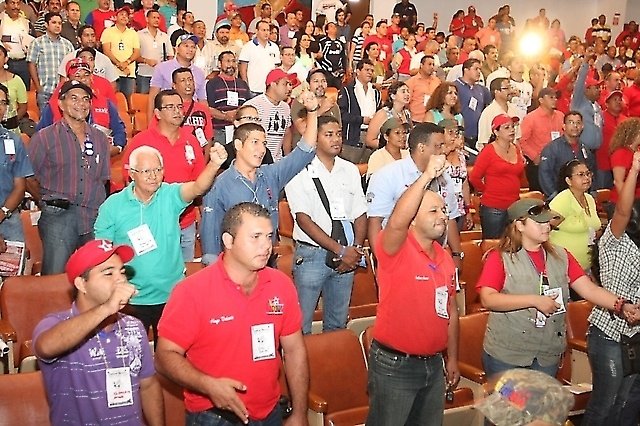
More than 2000 workers marched to the National Assembly in Caracas on July 26 in support of increased workers’ control.
Handing over a document with more than 45,000 signatures, the workers demanded that the legislative body approve the Special Law for Socialist Worker Councils and begin an immediate discussion of a “new and revolutionary” Organic Work Law (LOT).
Both demands were submitted under article 240 of the Venezuelan constitution, which allows the people the right to legislate.
Douglas Gomez, of the Venezuelan Communist Party (PCV), said: “These are two legal instruments that the workers are demanding. They are essential to advancing the process of accumulating the forces which will allow the workers to fulfil their protagonastic role in the construction of a new society.”
Convened by the Workers’ Control Movement, the workers’ socialist councils, the National Workers’ Union (Unete), the Workers’ Class Current and hundreds of unions throughout the country, the march was hailed as a success by workers and organisers alike.
Felix Martinez, general secretary of the New Generations of Mitsubishi Motors Workers (MMC) said in Anzoategui: “We want the workers to be the driving force behind the control of production in factories, so that products aren’t sold at speculative prices on the street, this will be achieved through worker control and the collective contract.”
National Assembly president Fernando Soto Rojas has promised a swift response to the workers' demands, which include the release of a schedule for public debate of the two laws before parliamentary recess on August 15.

The Special Law for Socialist Workers’ Councils was originally presented to the national assembly in 2007 by the PCV and supported by President Hugo Chavez.
The president called on Venezuelan workers to organise as a "revolutionary force" within the workplace, as well as within the community.
Although socialist worker’s councils were created, they became legally recognised only after sustained worker mobilisation and the approval of the Organic Law of Popular Power, passed in December 2010.
Independent of unions, the councils are organisations of popular power that allow the workers to take part in productive, administrative and management processes in their places of work.
Through the Special Law of Socialist Workers’ Councils, the aim of the councils is to become a legal mechanism through which the workers can play a “protagonistic role” in dismantling “exploitative” capitalist relations and advance the project of workers’ control.
The bill also proposes to consolidate the councils from a legal perspective to strengthen their position against “counterrevolutionary” efforts to undermine the workers’ control movement.
Regional meetings of socialist workers’ councils were held in February and the first national meeting of the councils was convened in May.
The marchers also demanded immediate discussion of a new and revolutionary work law to replace existing laws.
Proposals to completely overhaul the nation’s Organic Work Law were first put forward in 2003, but have been held up in the National Assembly.
A spokesperson from the workers’ movement said the new legislation should guarantee job security and the collective and individual rights of workers.
It should also establish a legal framework for “democratic, participative and collective management” by workers.
Rosso Grimau, spokesperson for the Socialist Workers’ Councils, said: “The workers are the motor of historical change and societal transformation. For this reason, a new and revolutionary law in accordance with the constitution of the Bolivarian Republic of Venezuela is necessary.”
Workers have vowed to maintain a state of “permanent mobilisation” to overcome opposition to the long-awaited laws.
A delegation will be sent to the National Assembly on August 9 to ensure that the National Electoral Committee has received the demands, as well as to receive details of the schedule for public debate on the two laws.
[Reprinted from www.venezuelanalysis.com .]